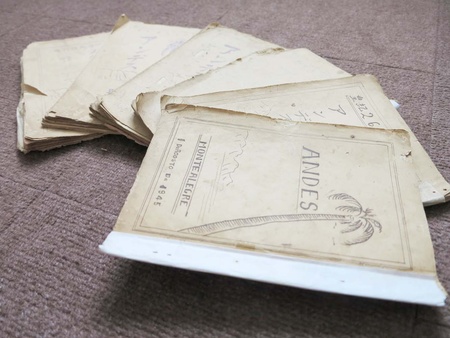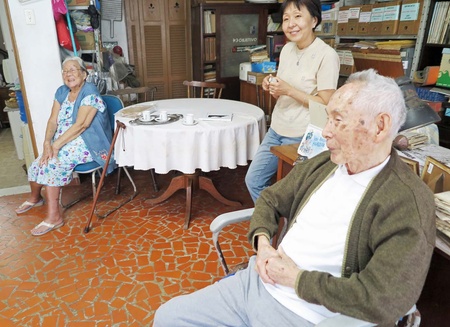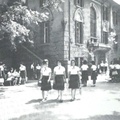Information on Victory as Fake News
As I was listening to Kami-san’s talk, I found that he began his “paper pellets” strategy when he was about 23 years old. During the time of the Monte Alegre colony, the cultural section of the youth organization began issuing the newsletter ANDES on August 1, 1945.
When I went to his house in September, 2016 for an interview, he showed me something he had treasured. It was a B5-size handwritten mimeographed booklet.
On the first issue, there was a list of notes in red print “Absolutely keep this issue out of sight of foreigners,” “After browsing, you are not allowed to take it out without permission of the person in charge.” It is clear that the browsing was done among members in utmost secrecy.
If the authorities had found it, they would have been sent to a DOPS prison without a doubt. The booklet must have been browsed among members in high tension and helped strengthen their bond. That’s why Kami-san had kept it with much care after 70 years. This small newsletter was full of information that the Empire of Japan had won the war, followed by articles stating that Japanese immigrants should fulfill their mission as Japanese nationals even in Brazil. It was an example of a "winning" magazine at the time.
The sixth issue became their final one, when Kami-san moved to Lins in February, 1946. In the preface of the final issue published in January, 1946, we can find the following: The holy war in East Asia ended with the victory of the Empire of Japan, and a few hundred millions of oppressed people in East Asian nations were rescued by Japan (unreadable) from the hands of greedy and evil Great Britain, America, France, and the Netherlands, and with Japan as the head of the alliance the establishment of the Great East Asia Co-prosperity Sphere is in progress. Let me repeat it here, but this was written in January, a year after the end of the war.
From the perspective of the losing group, it might have been a mere “victory hoax” or “victory news.” To put it in a buzz word of today, it was fake news.
But we can see the passion typical of a young man and with strong feelings for his home country Japan, where he was parted from when he was little. Given that 80% of the community belonged to the winning group at the time, I can’t help thinking that deep mentality of the immigrant mass can be seen there. If we don’t deny it as a “hoax” and face it, we can’t understand the mentality of immigrant crowd.
Reading this, for the first time I felt like I understood the reason why Kami-san fearlessly pointed at the army and repeatedly told me to write about the school, saying it had to be returned to colonia.
I would assume that the Japanese elites and property owners who chose to be part of the “losing group” after the war lost their hope under the dictatorship, treated unjustly with their property frozen and tortured by DOPS during the war. They chose to survive by ensuring unreasonable treatments of DOPS submissively. However, the immigrant mass, not being owners of property, developed the lust of battle against the government without being tortured during the war.
So it’s probably because the losing group was afraid of revenge from the government that they cooperated with the authorities and took the side to purge the winning group when people got divided into the two groups in the aftermath of the war.
The winning group was suppressed after the war, which made them unable to express their feelings for Japan, so they kept them deep inside their heart. And this is the very reason why the Nikkei community was able to maintain Japanese education and preserve Japanese culture.
However, in the history of immigrants compiled after the war, the winning group was simply labeled “insane” and their social contribution was deleted in its entirety.
It was because they “insanely” devoted their life to the inheritance of Japanese culture that the Nikkei community in Brazil has been able to preserve the Japanese language and culture. I believe that this is something that we as descendants of Nikkei people should recognize as truth.
Kami-san’s sister got married in Santos before the war and was evicted during the war. When she returned to Santos after the war, Kami-san looked to her and moved from Lins to Santos. And he heard how unreasonably people were evicted from Santos.
Kami-san told me. “At that time, many people had returned from eviction. They were told to leave the place within 24 hours taking only what they were wearing, you know? They were all very frustrated. Some people were evicted while their husbands were away fishing off the coast, and they didn’t know each other’s whereabouts for a few years.” What a cruel story.
When Kami-san heard about the eviction, it must have raised his fighting spirit all at once, with the wind blowing to the ember deep in his heart, which had been glowing quietly since his adolescence. As a symbolic act against the historical wrongdoings of freezing property and eviction, he devoted his passion to getting the Japanese school back. That’s why he was able to become Don Quixote.
He repeatedly told me that “the Japanese remain Japanese anytime, anywhere.” Because he was a person with such faith, I once asked him, “How many times did you go back to Japan?” I remember that he rather embarrassedly told me, “I haven’t gone back even once.”
While I waited for further explanation with a puzzled face, Kami-san’s wife, who was sitting next to him, helplessly added, “Back in the days we couldn’t go back unless we made money.” And I understood. People in the winning group in general were romantics, and they were not good at making money since they tended to be sympathetic, not thinking much about making profits. But this allowed them to devote their passion to the return movement, which brought them no money.
In June, 2008, when the completion ceremony of Santos Japanese School was held, Imperial Highness in attendance gave Kami-san a word of appreciation, “Thank you for your hard work.”
It must have been the greatest reward in his life.
© 2018 Masayuki Fukasawa







